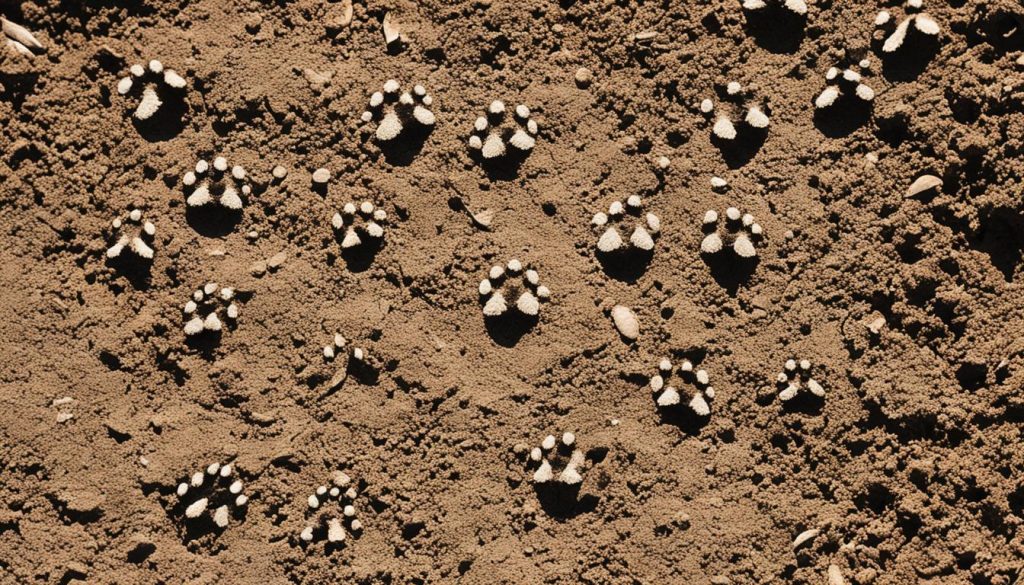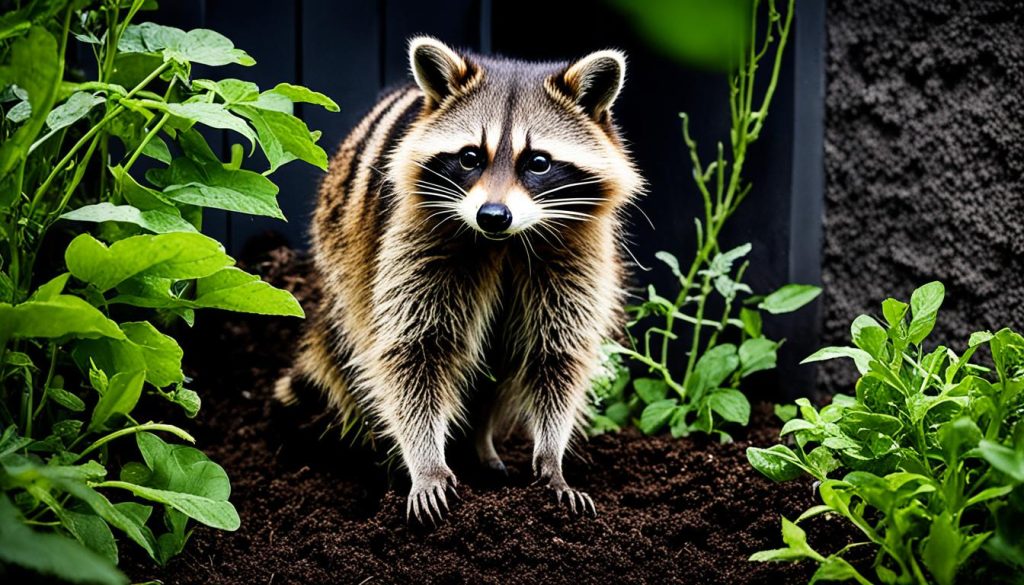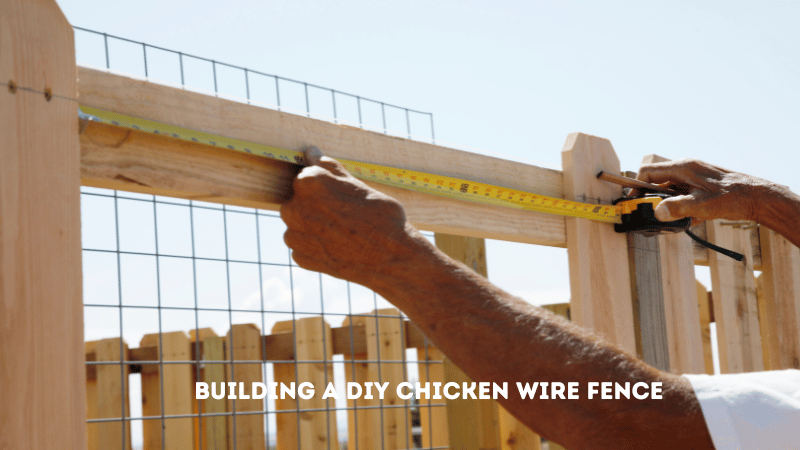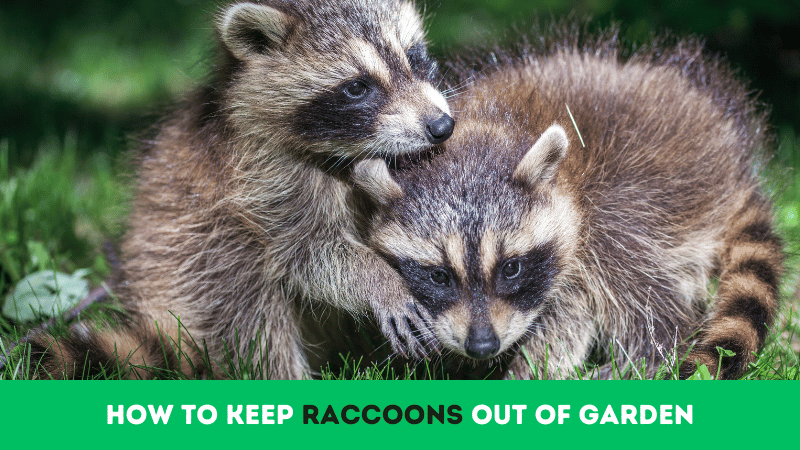Raccoons are a big issue for gardeners. With over 45 million in the U.S., they cause about $1.5 billion in damages every year. They mess up crops and landscaping, making life hard for those who love their gardens.
This guide will cover strategies and tips to help you protect your garden from these pests.
Identifying Raccoon Presence in Your Garden
The first step to solve a raccoon issue is spotting them in your garden. Gardeners need to know what to look for. This will help them keep raccoons away from their plants.
Distinct Paw Tracks

Raccoons have easily recognizable paw tracks. Their front and back paws both have five toes. These prints can be seen in soft ground near where they’ve been searching for food.
Raccoon Poop and Latrines
Raccoons pick places in your garden to use as toilets. Look for a lot of dark, cylindrical droppings in one area. This means they’re using it as a bathroom, which can be bad for your health and garden.
Trash Cans Being Looted
Raccoons are clever at getting into trash cans. If you find your trash cans in a mess, raccoons could be to blame.
Holes in Lawn and Mulch
Raccoons, as well as other animals like possums, are quite good at digging. Keep an eye out for holes in your lawn or garden. This is a sign they’re hunting for small creatures or insects under the ground.

Dead Livestock or Animals
Sometimes, dead animals are found due to raccoons. This could mean they are a danger to animals in the area.
Knowing these signs lets gardeners act. They can protect their gardens and stop raccoons from causing harm.
How to Keep Raccoons Out of Your Garden
The first step to keep raccoons out of your garden is to find how they are getting in. Once you know their paths, you can block them. This makes your garden a less attractive place for raccoons.
Identifying Entry Points
It helps to figure out where raccoons enter your garden. Knowing this can help you stop them better. By pinpointing their routes, you can implement targeted prevention measures.
Fencing Options
Putting up tough fences is a great way to keep raccoons away. A securing garden from raccoon raids method is using barriers like chicken wire or electric fencing. Note that electric fences are usually more expensive.
Ultrasonic Deterrents
Ultrasonic raccoon deterrents make sounds that raccoons hate. They can keep these animals away from your garden. But, sometimes raccoons get used to these sounds over time.
Strong-Smelling Substances
Strong smells like cayenne pepper, ammonia, or coyote urine can scare raccoons away. These are some of the best raccoon repellents for gardens. The strong scents make your garden a place that raccoons don’t want to be in.
Building a DIY Chicken Wire Fence

Putting up a strong chicken wire raccoon fencing can safeguard your garden. It’s a budget-friendly diy raccoon deterrent. This barrier keeps out pests like raccoons. It can even go underground to stop them from digging under.
Materials and Tools Needed
To make your yard safe from raccoons, gather these materials and tools:
- Chicken wire mesh (1/2″ openings, 19 gauge thickness)
- T/U-posts or wooden posts
- Framing lumber
- Poultry staples
- Zip ties
- Wire cutters
- Hammer
- Post hole digger (if setting posts in the ground)
Step-by-Step Instructions
Here’s how to make your DIY fence with these steps:
- Decide where your fence goes and put posts there. Make sure they’re spaced right.
- For wooden posts, dig and secure them. For T/U-posts, push them in where you marked.
- Make frames from lumber for your fence panels. Fit them to your garden’s shape.
- Size the chicken wire to fit the frames with some extra to secure it.
- Staple or tie the chicken wire tight to the frames.
- Attach the panels to posts with staples or ties.
- Keep one side open for a gate. Make sure it closes right.
Removing Food and Water Sources
Raccoons like visiting gardens and homes with plenty of raccoon food sources. To keep them away, it’s smart to manage these food sources. This means taking steps like keeping pet food and bird feeders secure, covering water sources, and locking up trash bins.
Protecting Pet Food and Bird Feeders
Raccoons can be sneaky and will check out places with pet food protection, like pet bowls and bird feeders. To stop them, keep pet food inside, raise bird feeders high, and maybe use special feeders. These feeders close up if a raccoon tries to get food, keeping it out of their reach.
Covering Water Sources
Having open water source management can also bring raccoons around. If you have ponds or birdbaths, make sure they are not easy to get to. You can cover or raise them. This deters raccoons who might be looking for a drink.
Securing Garbage Cans
Unlocked garbage cans are like a buffet for raccoons. To protect your trash and keep raccoons out, always use bins with locks. Also, keep the cans in a closed space like a shed. This keeps raccoons from coming around too often, since they can’t get to the food in the trash.
Other Deterrent Methods
Aside from putting up fences and removing food sources, there are many other tricks to keep raccoons away. These methods can work along with physical and habitat strategies. They boost the odds of stopping these pests from getting into your garden.
Motion-Activated Lights and Sprinklers
Motion-activated lights and sprinklers can do the job well. They surprise raccoons, making them think twice about entering your garden. When a raccoon moves, these devices turn on. This surprises the raccoon, and they will look for food elsewhere.
Radios or Noises
Playing radios or loud sounds at night can also work. These sounds stop raccoons from doing their usual nighttime business, like looking for food. Experiment with different sounds, like music, talk shows, or animal noises, to see what works best in keeping them away.
Planting Deterrent Plants
Some plants are natural raccoon repellents. Cucumbers, garlic, and marigolds have scents and tastes that raccoons don’t like. Planting these around your garden can form a barrier that raccoons will avoid.
Using a mix of these methods can really up your game against raccoons. It’s important to check what works and change your approach if needed. Doing this can keep your garden a happy and raccoon-free place.
Combining Multiple Strategies for Maximum Effectiveness
To keep raccoons out of the garden, using several methods works best. An integrated pest management strategy that blends different tactics is wise. The first source mentions how using various raccoon deterrent methods, like fences and removing food, is better than just one tactic. It means gardeners can have a strong system to stop raccoons from coming back.
It’s key to check if your methods are working against raccoons. This integrated pest management way lets you change with the raccoons’ moving habits. This way, your solution stays effective over time.
| Integrated Pest Management Strategies | Description | Effectiveness |
|---|---|---|
| Fencing | Utilize physical barriers, such as regular or electric fencing, to create a physical deterrent for raccoons. | High |
| Deterrents | Employ a variety of deterrents, including motion-activated devices, strong-smelling substances, and predator urine, to create an unpleasant environment for raccoons. | Moderate to High |
| Food Source Removal | Eliminate readily available food and water sources, such as pet food, bird feeders, and open water sources, to discourage raccoons from entering the property. | High |
Using a mix of tactics, like fencing and removing food, makes your garden safer from raccoons. It’s also important to always check how well your methods are working. This helps keep raccoons away for good.
Conclusion
Raccoons can really be a pain in the garden. However, there are ways to keep them out of your garden. This involves spotting where raccoons have been, knowing what they like to do, and using fences and other methods to keep them away. These steps can help gardeners take back their space and keep their veggies safe from raccoon mischief.
Zaki Infitar is the driving force and creative mind behind GreenBuilt.co. As a self-taught gardener with an unwavering passion for all things green, Zaki’s journey into the world of gardening is a testament to his dedication and love for nature.

